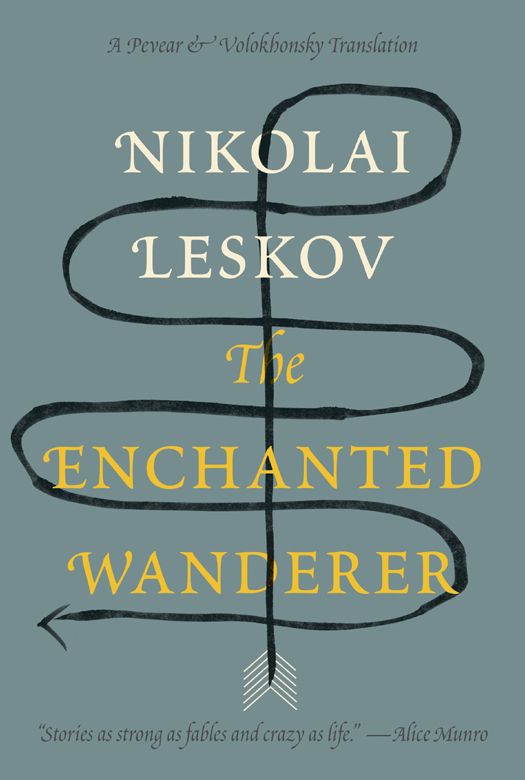
The Enchanted Wanderer and Other Stories
کتاب های مرتبط
- اطلاعات
- نقد و بررسی
- دیدگاه کاربران
نقد و بررسی

Starred review from March 25, 2013
A forgotten 19th-century Russian master, Leskov was celebrated in his own time by luminaries no less than Tolstoy and Chekhov; this collection, presented in an appropriately folksy translation by Pevear and Volokhonsky, makes it easy to see why. A relic of an older mode of narrative where tight narration and characterization give way to the sheer joy of storytelling, Leskov is fond of mysticism, framing narratives, and parabolic character sketches made all the more charming by their digressions and meanderings. In the title story, a reluctant monk relates his picaresque adventures across Russia as a Tartar hostage, a nursemaid, an actor, and an expert judge of horses before eventually surrendering to his destined role as a holy fool. In "The Sealed Angel", a group of itinerant bridge-builders pull off a daring church heist; an overly scrupulous and devout police constable wreaks havoc on a small town by refusing to be bribed in "Singlemind"; and in "Lefty" a simple gunsmith is made to behold the wonders of the England. Seasoned with equal parts humor and social commentary, Leskov's stories prove gentle but infectious portraits of the sorrow and joys of Russian peasantry.

February 1, 2013
A welcome new translation of Leskov's grand metaphysical romp, a hallmark of 19th-century Russian literature. Leskov (1831-1895) is less well-known in this country than his near-contemporaries Leo Tolstoy and Fyodor Dostoyevsky, and even if Anton Chekhov claimed him as a literary ancestor--and that's saying something--Leskov's masterpiece doesn't often figure on reading lists. Pevear and Volokhonsky, late of War and Peace, Anna Karenina and Dr. Zhivago, may remedy that with this accessible translation, which does a good job of preserving some of Leskov's well-known wordplay while not being pedantic. Pevear and Volokhonsky are known for preferring to use only English words in circulation at the time of a given book's original publication, so the tone has the slightest patina to it, as with sentences such as "I chose as a pretext that I supposedly had to go buy medicine from the herbalists for the horses, and so I went, but I went not simply, but with a cunning design." That said, the stories gathered here, all lightly linked in the way that those of the Canterbury Tales are, remain marvels of narration, sacred and profane--for, as the translators note, the Russian word strannik "can mean anything from a real pilgrim to a simple vagabond." The opener is a stern study in the dangers of adultery; then come other pieces set in "Wooden Russia," the old heartland south of Moscow, with all its elaborate prejudices against Gypsies, Jews, Ukrainians and the other outsiders who so often figure in Leskov's pages. One takeaway: Leskov admonishes us not to fear ghosts, for they "behaved themselves much more light-mindedly and, frankly speaking, stupidly, than they had shown themselves in earthly life." A literate delight, and a book to look forward to reading more than once.
COPYRIGHT(2013) Kirkus Reviews, ALL RIGHTS RESERVED.

November 15, 2012
A convention-bending 19th-century Russian author, Leskov is not well known here. But his prize-winning translators, Richard Pevear and Larissa Volokhonsky, certainly are. Sophisticated readers will be intrigued.
Copyright 2012 Library Journal, LLC Used with permission.

February 15, 2013
While Dostoyevsky and Tolstoy produced gargantuan novels that put Russia on the world literary map, Leskov (183195) thrived with short fiction, achieving similar renown only with (and because Shostakovich made an opera of it) the chilling The Lady Macbeth of Mtsensk. Pevear and Volokhonsky, whose versions of the big novels have set a new standard for translation from Russian, reinvigorate Leskov in sharp, plain, vitally annotated versions of 17 pieces that show off his distinctiveness. He was much more of a local colorist than his great contemporaries, nearly always setting his tales in and around his own hometown, as in The Enchanted Wanderer, whose outsize protagonist yet roams far, encountering wonders. Leskov besprinkles the tales with real places, events, and persons (which is why the explanatory notes are so welcome) and characteristically tells the stories via a seasoned oral storyteller who chooses his words to be understood, not to impress. The great American Leskov most immediately recalls is Mark Twain. But Leskov is less satiric and more affectionate than Twain, altogether exceptional.(Reprinted with permission of Booklist, copyright 2013, American Library Association.)

























دیدگاه کاربران